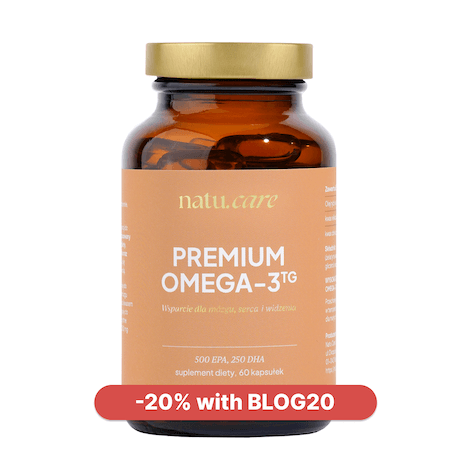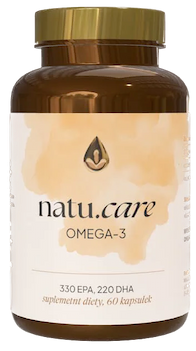- Home
- Omega acids
- Deficiency of omega-3 fatty acids
Omega-3 fatty acid deficiency: symptoms, how to supplement + doctor's advice
Symptoms of omega-3 fatty acid deficiency are not characteristic, but should get your attention.


Learn more about our editorial process
.

Learn more about our editorial process
.

Learn more about our editorial process
.

Learn more about our editorial process
.
Why you can trust us
Articles on Natu.Care are written based on scientific research, data from government websites and other reliable sources. The texts are written in cooperation with doctors, nutritionists and other health and beauty experts. Articles are reviewed before publication and during significant updates.
.Learn more about our editorial process
.Information about advertisements
Content on Natu.Care may contain links to products from the sale of which we may receive a commission. When creating content, we adhere to high editorial standards and take care to be objective about the products discussed. The presence of affiliate links is not dictated by our partners, and we select the products we review ourselves completely independently.
.Learn more about our terms and Conditions
.Eyelid twitching - probably lack of magnesium. Bunions - maybe not enough B vitamins. And omega-3 fatty acids? What is "the one" symptom of deficiency?
.Unfortunately, diagnosis - especially autodiagnosis - is very difficult here. Which is all the more frustrating because omega-3 is an absolutely key fatty acid that you are probably eating too little of.
It's not easy.
We will tell you how your body may be manifesting too few healthy fats in your diet. Let this motivate you to see your doctor (and go to the shop, to buy a fatty fish).

Sprawdź, za co pokochały go tysiące klientek Natu.Care Premium Omega-3ᵀᴳ -15% z kodem BLOG15
Natu.Care Omega-3ᵀᴳ Premium
Natu.Care Omega-3ᵀᴳ Premium dla zdrowia serca, mózgu i odporności. Najlepsza przyswajalność. Optymalna dawka 750 mg. Przebadana przez niezależne laboratorium.
Zobacz więcej
Produkt ma super skład, transparentną etykietę i co dla mnie jest ważne – małe kapsułki do połknięcia. Nie ma też nieprzyjemnego efektu odbijania rybą, który miałam spożywając inne produkty. Widzę znaczną poprawę odporności. Polecam!@Kasia P.
See also:
.- Omega-3 fatty acids .
- Omega-6 fatty acids
- Omega-9 fatty acids
- Omega acids .
- DHA acid .
- EPA acid
- ALA acid
- Omega-3-6-9 acids .
Remember - if any symptoms concern you, go to the doctor. Not to Dr Google's virtual office. To a real one. In the article I can direct you and motivate you to visit, but this is no substitute for medical advice and treatment.
Omega-3 deficiency - symptoms
.Symptoms of omega-3 fatty acid deficiency include:
- dryness of the skin, .
- keratosis of the epidermis, .
- dry eyes, .
- joint pain, .
- hair loss, .
- lower mood, .
- fatigue, .
- frequent, recurrent infectionsand. .
These symptoms of omega-3 fatty acid deficiency are non-specific and are not a 100% confirmation that you happen to be suffering from omega-3 deficiency.
It is good that you are interested in symptoms, especially if you are experiencing them or are worried about a loved one. However, remember that diagnosing yourself online is not a good idea. If something is worrying you, see a doctor.
.Doctor of Medicine explains:
..The symptoms of omega-3 fatty acid deficiency are not characteristic and may indicate a lack of other vitamins, minerals or nutrients. However, if you are experiencing any of the symptoms from this article, see your GP.
 .
.
Witold Tomaszewskidoctor of medical sciences
.Under the suggested omega-3 supplements, you will read a detailed description of what are the potential symptoms of omega-3 acid deficiency.
Product description
The dietary supplement contains omega-3ᵀᴳ, or omega-3 acids in the form of trójglyceridesów. Scientific studies suggest that this form of fatty acidsós up to 2 times better absorbed than the estersós present in many dietary supplements on the market. This means that you are assured of their effectiveness and of supplying yourself with valuable omega acids.
Fatty acids omega-3 are derived from wild anchovy oil. It is a rich source of healthy fats that are essential for the health of the cardiovascular, immune and nervous systems, as well as the proper function of vision, joints muscles.
Scientific research suggests that wild anchovies are a good source of healthy fats.
Scientific research also suggests that an adequate intake of omega-3 fatty acidsós protects against and supports the treatment of depression and anxiety disorders. In addition, omega-3s influence the hydration and appearance of the skinóry and support healthy sleep.
.
The formula contains a total of 750 mg of EPA+DHA acidsós, which is three times higher than the recommended minimum of 250 mg for the Polish population. Omega-3 TG Premium has studies indicating that its TOTOX is 9, which is a very good result.
Supplementation of omega-3 fatty acidsóis recommended for anyone who does not eat 1–2 portions (approximately 300 g) of oily fish per week. Children during growth, seniors, physically active people, vegans and vegetarians, as well as patients undergoing cardiovascular treatment and prevention of heart disease also have an increased need.
Pros and cons
The dietary supplement contains omega-3ᵀᴳ, or omega-3 acids in the form of trójglyceridesów. Scientific studies suggest that this form of fatty acidsós up to 2 times better absorbed than the estersós present in many dietary supplements on the market. This means that you are assured of their effectiveness and of supplying yourself with valuable omega acids.
Fatty acids omega-3 are derived from wild anchovy oil. It is a rich source of healthy fats that are essential for the health of the cardiovascular, immune and nervous systems, as well as the proper function of vision, joints muscles.
Scientific research suggests that wild anchovies are a good source of healthy fats.
Scientific research also suggests that an adequate intake of omega-3 fatty acidsós protects against and supports the treatment of depression and anxiety disorders. In addition, omega-3s influence the hydration and appearance of the skinóry and support healthy sleep.
.
The formula contains a total of 750 mg of EPA+DHA acidsós, which is three times higher than the recommended minimum of 250 mg for the Polish population. Omega-3 TG Premium has studies indicating that its TOTOX is 9, which is a very good result.
Supplementation of omega-3 fatty acidsóis recommended for anyone who does not eat 1–2 portions (approximately 300 g) of oily fish per week. Children during growth, seniors, physically active people, vegans and vegetarians, as well as patients undergoing cardiovascular treatment and prevention of heart disease also have an increased need.
Additional information
The dietary supplement contains omega-3ᵀᴳ, or omega-3 acids in the form of trójglyceridesów. Scientific studies suggest that this form of fatty acidsós up to 2 times better absorbed than the estersós present in many dietary supplements on the market. This means that you are assured of their effectiveness and of supplying yourself with valuable omega acids.
Fatty acids omega-3 are derived from wild anchovy oil. It is a rich source of healthy fats that are essential for the health of the cardiovascular, immune and nervous systems, as well as the proper function of vision, joints muscles.
Scientific research suggests that wild anchovies are a good source of healthy fats.
Scientific research also suggests that an adequate intake of omega-3 fatty acidsós protects against and supports the treatment of depression and anxiety disorders. In addition, omega-3s influence the hydration and appearance of the skinóry and support healthy sleep.
.
The formula contains a total of 750 mg of EPA+DHA acidsós, which is three times higher than the recommended minimum of 250 mg for the Polish population. Omega-3 TG Premium has studies indicating that its TOTOX is 9, which is a very good result.
Supplementation of omega-3 fatty acidsóis recommended for anyone who does not eat 1–2 portions (approximately 300 g) of oily fish per week. Children during growth, seniors, physically active people, vegans and vegetarians, as well as patients undergoing cardiovascular treatment and prevention of heart disease also have an increased need.
Expert opinion
The dietary supplement contains omega-3ᵀᴳ, or omega-3 acids in the form of trójglyceridesów. Scientific studies suggest that this form of fatty acidsós up to 2 times better absorbed than the estersós present in many dietary supplements on the market. This means that you are assured of their effectiveness and of supplying yourself with valuable omega acids.
Fatty acids omega-3 are derived from wild anchovy oil. It is a rich source of healthy fats that are essential for the health of the cardiovascular, immune and nervous systems, as well as the proper function of vision, joints muscles.
Scientific research suggests that wild anchovies are a good source of healthy fats.
Scientific research also suggests that an adequate intake of omega-3 fatty acidsós protects against and supports the treatment of depression and anxiety disorders. In addition, omega-3s influence the hydration and appearance of the skinóry and support healthy sleep.
.
The formula contains a total of 750 mg of EPA+DHA acidsós, which is three times higher than the recommended minimum of 250 mg for the Polish population. Omega-3 TG Premium has studies indicating that its TOTOX is 9, which is a very good result.
Supplementation of omega-3 fatty acidsóis recommended for anyone who does not eat 1–2 portions (approximately 300 g) of oily fish per week. Children during growth, seniors, physically active people, vegans and vegetarians, as well as patients undergoing cardiovascular treatment and prevention of heart disease also have an increased need.
Product description
The dietary supplement contains high-quality fatty acids omega-3 from anchovy oil. It is a naturally rich source of healthy fats that are essential for cardiovascular, immune and nervous system health, as well as proper function of eyesight, joints muscles.
Scientific research also suggests that an adequate intake of omega-3 fatty acidsós protects against and supports the treatment of depression and anxiety disorders. In addition, omega-3s influence the hydration and appearance of the skinóry and support healthy sleep.
.
The dietary supplement contains 550 mg EPA+DHA per daily serving. This is more than double the official recommendations for the Polish population, whichóre suggesting an intake of at least 250 mg per day.
Supplementation of EPA+DHA is a good way to support healthy sleep.
Supplementation with omega-3 fatty acidsós is advisable if you do not consume 1–2 portions (approx. 300 g) of oily fish per week. There is also an increased need for physically active people, vegans and vegetarians, seniors, children during growth spurts and patients undergoing cardiovascular treatment and prevention of heart disease.
Pros and cons
The dietary supplement contains high-quality fatty acids omega-3 from anchovy oil. It is a naturally rich source of healthy fats that are essential for cardiovascular, immune and nervous system health, as well as proper function of eyesight, joints muscles.
Scientific research also suggests that an adequate intake of omega-3 fatty acidsós protects against and supports the treatment of depression and anxiety disorders. In addition, omega-3s influence the hydration and appearance of the skinóry and support healthy sleep.
.
The dietary supplement contains 550 mg EPA+DHA per daily serving. This is more than double the official recommendations for the Polish population, whichóre suggesting an intake of at least 250 mg per day.
Supplementation of EPA+DHA is a good way to support healthy sleep.
Supplementation with omega-3 fatty acidsós is advisable if you do not consume 1–2 portions (approx. 300 g) of oily fish per week. There is also an increased need for physically active people, vegans and vegetarians, seniors, children during growth spurts and patients undergoing cardiovascular treatment and prevention of heart disease.
Additional information
The dietary supplement contains high-quality fatty acids omega-3 from anchovy oil. It is a naturally rich source of healthy fats that are essential for cardiovascular, immune and nervous system health, as well as proper function of eyesight, joints muscles.
Scientific research also suggests that an adequate intake of omega-3 fatty acidsós protects against and supports the treatment of depression and anxiety disorders. In addition, omega-3s influence the hydration and appearance of the skinóry and support healthy sleep.
.
The dietary supplement contains 550 mg EPA+DHA per daily serving. This is more than double the official recommendations for the Polish population, whichóre suggesting an intake of at least 250 mg per day.
Supplementation of EPA+DHA is a good way to support healthy sleep.
Supplementation with omega-3 fatty acidsós is advisable if you do not consume 1–2 portions (approx. 300 g) of oily fish per week. There is also an increased need for physically active people, vegans and vegetarians, seniors, children during growth spurts and patients undergoing cardiovascular treatment and prevention of heart disease.
Expert opinion
The dietary supplement contains high-quality fatty acids omega-3 from anchovy oil. It is a naturally rich source of healthy fats that are essential for cardiovascular, immune and nervous system health, as well as proper function of eyesight, joints muscles.
Scientific research also suggests that an adequate intake of omega-3 fatty acidsós protects against and supports the treatment of depression and anxiety disorders. In addition, omega-3s influence the hydration and appearance of the skinóry and support healthy sleep.
.
The dietary supplement contains 550 mg EPA+DHA per daily serving. This is more than double the official recommendations for the Polish population, whichóre suggesting an intake of at least 250 mg per day.
Supplementation of EPA+DHA is a good way to support healthy sleep.
Supplementation with omega-3 fatty acidsós is advisable if you do not consume 1–2 portions (approx. 300 g) of oily fish per week. There is also an increased need for physically active people, vegans and vegetarians, seniors, children during growth spurts and patients undergoing cardiovascular treatment and prevention of heart disease.
ALLNUTRITION Omega 3 Strong
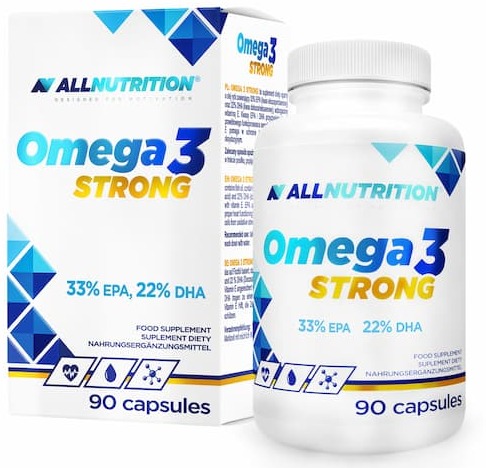
- Content omega-3 acids: 550 mg (DHA 220 mg + EPA 330 mg)
- Additional active ingredients: vitamin E
- Form: capsules .
- Dose: 1 capsule per day .
- Sufficient for: 90 days .
Product description
A dietary supplement with a solid portion of DHA and EPA – valuable for health and well-being omega-3 acidsós. Indicated especially for people on a plant-based diet, physically active people and seniors.
.The sourceóof omega-3 acids in this preparation is fish oil.
.Pros and cons
A dietary supplement with a solid portion of DHA and EPA – valuable for health and well-being omega-3 acidsós. Indicated especially for people on a plant-based diet, physically active people and seniors.
.The sourceóof omega-3 acids in this preparation is fish oil.
.Additional information
A dietary supplement with a solid portion of DHA and EPA – valuable for health and well-being omega-3 acidsós. Indicated especially for people on a plant-based diet, physically active people and seniors.
.The sourceóof omega-3 acids in this preparation is fish oil.
.User review
A dietary supplement with a solid portion of DHA and EPA – valuable for health and well-being omega-3 acidsós. Indicated especially for people on a plant-based diet, physically active people and seniors.
.The sourceóof omega-3 acids in this preparation is fish oil.
.Solgar Omega 3-6-9
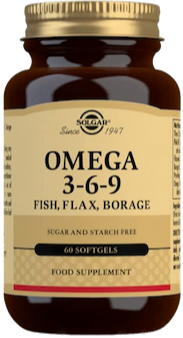
- Content of omega acids:.
- Omega-3 fatty acids.
- Omega-3 fatty acids
- alpha-linolenic acid (ALA) – 585 mg
.- eicosapentaenoic acid (EPA) – 344 mg
- docosahexaenoic acid (DHA) – 221 mg
.
- Omega-3 fatty acids
- Omega-6 fatty acids.
- linoleic acid (LA) – 598 mg .
- gamma-linolenic acid (GLA) – 274 mg .
- Omega-9 fatty acids.
- Oleic acid – 325 mg .
- Omega-3 fatty acids.
- Source of omega acids: fish oil from anchovies, mackerel, sardines, linseed oil, cucumber oil .
- Form: capsules .
- Packaging: 60 capsules .
- Daily allowance:3 capsules per day .
- Sufficient for: 20 days .
Product description
A combination of omega 3-6-9 fatty acidsós derived from fish and plants. The dietary supplement supplements essential omega fatty acids, whichóre needed for the proper functioning of many systemsóorgansóin the body.
Pros and cons
A combination of omega 3-6-9 fatty acidsós derived from fish and plants. The dietary supplement supplements essential omega fatty acids, whichóre needed for the proper functioning of many systemsóorgansóin the body.
Additional information
A combination of omega 3-6-9 fatty acidsós derived from fish and plants. The dietary supplement supplements essential omega fatty acids, whichóre needed for the proper functioning of many systemsóorgansóin the body.
A combination of omega 3-6-9 fatty acidsós derived from fish and plants. The dietary supplement supplements essential omega fatty acids, whichóre needed for the proper functioning of many systemsóorgansóin the body.
Omega + Vitamin D3 800 IU for children
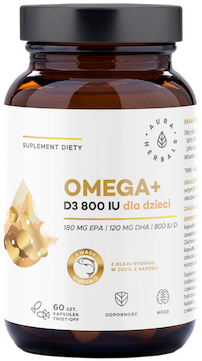
- Content of omega-3 fatty acids: 300 mg (180 mg EPA + 120 mg DHA)
- .
- Additional active ingredients: vitamin D3
- Form: twist-off capsules
- .
- Dose: 1 capsule per day
- .
- Sufficient for: 60 days
- .
Product description
Omega-3 acids for children with added vitamin D3 in good doses. The formula fills the daily requirement of EPA and DHA and vitamin D for children aged 2–18 years.
The Ministry of Health recommends supplementation with vitamin D3. In turn, omega-3 fatty acids are also crucial for the youngest.
The dietary supplement from Aura Herbals supports mós brain function, proper vision and immune system function.
The omega-3 fatty acids are derived from fish oil sourced from anchovies.
Pros and cons
Omega-3 acids for children with added vitamin D3 in good doses. The formula fills the daily requirement of EPA and DHA and vitamin D for children aged 2–18 years.
The Ministry of Health recommends supplementation with vitamin D3. In turn, omega-3 fatty acids are also crucial for the youngest.
The dietary supplement from Aura Herbals supports mós brain function, proper vision and immune system function.
The omega-3 fatty acids are derived from fish oil sourced from anchovies.
Additional information
Omega-3 acids for children with added vitamin D3 in good doses. The formula fills the daily requirement of EPA and DHA and vitamin D for children aged 2–18 years.
The Ministry of Health recommends supplementation with vitamin D3. In turn, omega-3 fatty acids are also crucial for the youngest.
The dietary supplement from Aura Herbals supports mós brain function, proper vision and immune system function.
The omega-3 fatty acids are derived from fish oil sourced from anchovies.
User review
Omega-3 acids for children with added vitamin D3 in good doses. The formula fills the daily requirement of EPA and DHA and vitamin D for children aged 2–18 years.
The Ministry of Health recommends supplementation with vitamin D3. In turn, omega-3 fatty acids are also crucial for the youngest.
The dietary supplement from Aura Herbals supports mós brain function, proper vision and immune system function.
The omega-3 fatty acids are derived from fish oil sourced from anchovies.
Dryness and skin irritation
.Docosahexaenoic acid (DHA) - one of the omega-3 fatty acids - is a structural component of the skin and is responsible for the health of cell membranesand. Its adequate concentration promotes skin hydration and protects it from premature ageing . Another acid - eicosapentaenoic acid (EPA) - reduces inflammation caused by exposure to UV radiation, which promotes skin cancerand.
This is why a deficiency of omega-3 fatty acids is most often first seen on the skin. What should attract your attention?
- Dry skin: a feeling of tightness (especially on the face), dry hands, often with white furrows on the inside and on the knuckles, itching of the skin and the appearance of white "pollen" when scratching (this is what dry skin is).
- Edermis keratosis: Dry, protruding "burrs" that you feel like scratching are dead skin that hasn't naturally exfoliated as it should.
- Acne aggravation: too little omega-3 fatty acids reduce their anti-inflammatory abilities, so acne lesions can get worse.
- Redness and skin irritation: too little omega-3 fatty acids cause a loss of moisture in the skin, which is sensitive and prone to irritation.
Interesting study
In one scientific study, participants who took 4 grams of EPA acid daily for 3 months experienced a 136% increase in sunburn resistanceand. Conclusion: supplement with omega-3s and take them with you on sunny holidays.
Dry eyes
.The feeling of dry eye is unpleasant. You blink, rub, trying to "squeeze out" a tear, but it doesn't help. This could be a symptom of an omega-3 fatty acid deficiency, as DHA acid is the main structural component of the retina. It supports its development and function, and when there is too little of it - dryness in the eye.
If you feel dry eyes, blink often or rub your eyes - it means you're not drinking enough water, sitting in front of the computer too much, not getting enough sleep or... it's time for supplementation with omega-3 fatty acids.
Interesting study
.In a scientific studyand involving 64 people with dry eye syndrome, one group of participants consumed 2 capsules of DHA and EPA acids per day and the other a placebo. After 30 days, those who took the omega-3 acids experienced improved eye lubrication, reduced dry eye symptoms and increased tear production.
Joint pain and stiffness
.Omeega-3 fatty acids fight inflammation in the bodyand, so their role in the treatment of arthritis has been extensively studied.
Joint pain and stiffness when getting out of bed in the morning or when lifting, limited mobility - if you are experiencing these symptoms (regardless of age), it is time to look at how your musculoskeletal system is working.
Low physical activity, sedentary work and poor diet promote the development of musculoskeletal diseases. The earlier you start treatment and rehabilitation, the better the chance of improving joint and muscle health. Conversely, in the advanced, neglected stage of degeneration, it is very difficult or impossible to reverse it at all..
 .
.
Michal Bojemski physiotherapist
Important
According to research studies, people who supplement with omega-3 fatty acids or consume a lot of fish in diet have less stiffness and less need for pain medicationand.
Hair loss
.Hair clumps on your brush, on your clothes, in your drains - you'll notice hair loss right away. Their loss has a wide range of causes - from hormonal disorders, to medications taken, to a nutrient-poor diet.
Scientific research finds a correlation between omega-3 fatty acids and hair health. These healthy fats affect the condition of the skin, so also the scalp - that is, the skin on the head. A healthy scalp is a fertile ground for the growth of strong hair. Too little omega-3 and other ingredients can result in hair loss.
What does the scientific research suggest?"
.A scientific study involving 120 women found that six-month supplementation with omega-3 and 6 fatty acids increased hair density and reduced hair lossand.
See also:
.Mood deprivation
.Omega-3 fatty acids are a component of the brain and support nervous system functionand. They exhibit neuroprotective effects, that is, they protect against premature brain ageing and prevent nerve cell damage. They also influence mental health.
Many scientific studies suggestand a correlation between low levels of omega-3 fatty acids and a higher incidence of depression. The doctor comments:
Metabolites of omega-3 fatty acids may increase concentrations of serotonin, the 'happy hormone', a deficiency of which is key in the development of depression..
 .
.
Marcin Zarzycki physician
If you are experiencing:
.- lower mood,
If you are experiencing the following symptoms
See your GP or a specialist psychiatrist. These are serious symptoms, and your mind is letting you know it's time to take care of it.
An analysis of 26 scientific studies involving 2,160 participants found that taking omega-3 fatty acid supplements had a beneficial effect on reducing depressive symptomsand.
Omega-3 fatty acid deficiency in children
.Symptoms of omega-3 fatty acid deficiency in children can be the same as described above. In the case of this age group, it is also worth noting other symptoms.
In children, omega-3 deficiency may manifest asand:
.- developmental disorders, .
- mood disorders, .
- concentration and attention problems, .
Scientific research suggestsand that omega-3 fatty acid deficiency may contribute to psychiatric and neurodevelopmental disorders in children. Some studies have shownand that children with ADHD have lower blood concentrations of omega-3 fatty acids than children without ADHD.
A deficiency of omega-3 fatty acids may exacerbate the course of disorders such as ADHD, or attention deficit hyperactivity disorder..
 .
.
Jagoda TurowskaPsychologist and social skills trainer
See also:
.Pregnancy omega-3 fatty acid deficiency
.Many women in diet during pregnancy forgo the consumption of fish rich in omega-3 fatty acids and are therefore at risk of omega-3 deficiencyand. Symptoms in pregnant women will be no different to those described above. However, it is important to be aware of the serious consequences of a deficiency, not only for the mother, but also for the baby.
Pregnant women often wonder whether they can eat fish. There is so much talk about mercury, parasites, bacteria... Dietitian Aleksandra Cudna explains:
Pregnant women often wonder whether they can eat fish.
Pregnant women do not have to give up eating fish. It is important that they follow the following rules when choosing fish:
Pregnant women do not have to give up eating fish.
- Fish should come from a secure source. The best fish are caught in the Pacific, Atlantic and North Sea, non-predatory and fatty. Look at the origin of the fish on the package. .
- Choose fish that contain as few harmful substances as possible. These include, for example, Norwegian salmon, trout, sardine, herring, pollock. .
- Do not eat raw fish. Choose cooked steamed or baked. .
Not enough healthy fats can increase the risk of premature birth. In addition, omega-3 fatty acids are essential for fetal brain and eye development, and reduced intake of omega-3 fatty acids during pregnancy can have a negative impact on fetal neurodevelopmentand.
If you are pregnant and do not know how to safely supplement omega-3 fatty acids or obtain them with your diet, advise your doctor or dietician.
See also:
Cause of deficiency
.Dietitian explains:
.The most common cause of omega-3 fatty acid deficiency is insufficient amounts of omega-3 fatty acids in the diet and the concomitant consumption of excess omega-6 fatty acids..
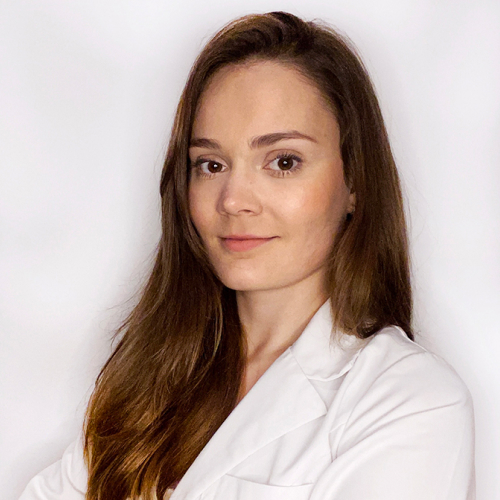 .
.
Alexandra Cudna Clinical nutritionist
In Poland, we do not have a tradition of eating fish like in Scandinavian countries, for example. Instead, we consume a lot of omega-6 acids, which "compete" with omega-3 for a place in the body. The valuable omega-3 fatty acids lose out because there are too few of them compared to the fatty opposite.
Learn more
- Omega 3-6-9 acids .
Those at risk of omega-3 fatty acid deficiency are:
.- people on a vege diet, .
- pregnant and breastfeeding women, .
- persons who are very physically active,
- public health professionals
- persons aged 65+and. .
How to know if I have an omega-3 fatty acid deficiency?
.Symptoms of omega-3 fatty acid deficiency are non-specific and may be indicative of insufficient intake of other nutrients, such as vitamins or minerals. If you observe anything of concern, see your doctor. Based on a history of your diet, lifestyle and activity, he or she will help you find the cause.
You can also have a blood test to determine the concentration of DHA and EPA acids. This test serves, among other things, the early prevention of diet-related diseases (e.g. type II diabetes, obesity). The average price of a blood test privately is around £200.
.I think I have a deficiency... What next?
.The symptoms match, and you are not keen on fish. If you suspect you have an omega-3 fatty acid deficiency, go to your GP. He or she will ask about your lifestyle, activity, diet and order a list of tests for further diagnosis. Maybe it's not an omega-3 fatty acid deficiency or maybe another problem - don't guess, don't delay.
How to supplement omega-3 fatty acids?
.Buy a good dietary supplement or tran or find room in your menu (and belly) for 1-2 portions of oily fish a week. But be warned - there are fish and fishes. A client of mine who I strength train boasted to me that she eats up to 4 portions of fish a week. What kind of fish - I asked.Fish sticks - she replied. I turned pale as an Atlantic cod.
Fish sticks - they have little to do with fish and its health-promoting properties. At the production stage, they are coated and deep-fried, and contain a large amount of unhealthy fats which are pro-inflammatory and promote the formation of atherosclerotic lesions, for example.
.. .
Alexandra Cudna Clinical nutritionist
"Unlike fresh fish, processed fish products are high in calories and contain almost no beneficial omega-3 fatty acids, due to the fact that they are made from lean fish (pollock, hake), which do not contain the same amount of healthy fats as fatty fish," adds the nutritionist.
Clinical nutritionist.
Pick real fish: mackerel, salmon, herring, salmon trout. My client went crazy for the salmon and avocado tartare. Look for recipes, try, taste.
.If you're on a vege diet, consider omega-3 supplementation. Products for people on a meat-free diet are becoming increasingly common and are effective in supplementing the deficiency of these fatty acids in the diet.
Omega-3 fatty acids: why are they so important?
.Omega-3 fatty acids are essential fats that play a key role in health and well-being. Your body cannot produce them on its own, so you need to supply them from your dietand.
These acids are called 'good fats' because they are essential for the functioning of your brain, heart, eyes, liver, immunity and psycheand. What's more - nice skin and shiny hair are also due to themand. They are also an important ingredient in the diet of active people and athletes.
.Omega-3 fatty acids are involved in many key processes needed for life. Their deficiency negatively affects the health of the nervous, cardiovascular, endocrine, immune and mental systems.
 .
.
Witold Tomaszewskidoctor of medical sciences

I hope you already know what to do about your symptoms. Look out for worrying symptoms in yourself and loved ones, but take the first steps towards diagnosis to your doctor's surgery. Don't knock on the door of the internet.
See also:
- Omega drug not supplement
- EPA+DHA acids
- Omega-3s for kids. Which are the best ones?
- Vitamin B12 deficiency
- How to make up for vitamin B12 deficiency?
- Vitamin D deficiency
- Collagen deficiency
- Hair loss - causes, treatment .
Summary
.In summary
- There are no clear-cut, typical symptoms of omega-3 fatty acid deficiency.
- There are no clear-cut, typical symptoms of omega-3 fatty acid deficiency.
- People with omega-3 fatty acid deficiency are most commonly observed to have dry and irritated skin, increased acne, dry eyes, joint pain, hair loss and depressed mood.
- The following are common symptoms of omega-3 fatty acid deficiency.
- Pregnant women, breastfeeding women, seniors, very physically active people and people on a vege diet are at risk of omega-3 fatty acid deficiency. .
- Privately, the concentration of omega-3 fatty acids - DHA and EPA - can be tested. .
- Omega-3 fatty acid deficiencies can be prevented with a diet rich in oily fish or supplementation. .
FAQ
.What causes a lack of omega-3?
.Deficiency of omega-3 acids in the body can be caused by insufficient intake of omega-3s from the diet, a diet rich in processed foods, certain diseases (e.g. liver disease and inflammatory bowel disease), the use of certain medications (e.g. anti-inflammatory drugs), smoking and excessive alcohol consumption.
Who should take omega-3?
.Anyone who is unable to get omega-3 fatty acids from a diet (e.g. on a vege diet or a menu full of processed foods and unhealthy fats) and those with an increased need for these acids, i.e. pregnant and breastfeeding women and children, should take omega-3s.
What time of day to take omega-3s?
.It does not matter what time of day you take omega-3 fatty acids, it is advisable to take them with a meal with healthy fats to improve the absorption of omega fatty acids. For convenience, omega-3 fatty acids can be taken together with vitamin D3 at lunch, for example. Both compounds are fats and will assimilate well together. Plus, the extra food will suppress the fishy aftertaste when, well, you bounce.
Do you get fat from omega-3 fatty acids?
You do not get fat from omega-3 fatty acids alone, but from excessive kilocalories from products containing these acids. Exceeding one's calorie requirements on a daily basis can lead to weight gain. You do not get fat from implementing omega-3 capsules into your diet. One capsule has about 10 kcal and a tablespoon of liquid about 45 kcal.
You do not get fat from omega-3 fatty acids alone, but from excessive kilocalories from products containing these acids. Exceeding one's calorie requirements on a daily basis can lead to weight gain. You do not get fat from implementing omega-3 capsules into your diet. One capsule has about 10 kcal and a tablespoon of liquid about 45 kcal.
Who should not take omega-3?
.Without consulting a doctor, omega-3 fatty acids should not be taken by: people taking medications that affect blood clotting (e.g. aspirin, warfarin or heparin), pregnant women, people with heart disease and diabetes.
With what not to combine omega-3?
.Omega-3 acids must not be combined with medicines that affect blood clotting (e.g. aspirin, heparin, warfarin) and alcohol. People taking these drugs or who regularly consume alcohol should consult their doctor.
How long to take omega-3?
.Dietary supplements with omega-3 acids can be a regular part of your diet, especially if you do not eat fish rich in these acids (e.g. on a vege diet or during pregnancy). omega-3 fatty acids are worth supplementing all year round.
How long can omega-3 be used?
.Omega-3 fatty acids can be used all year round. It is a particularly important dietary supplement if you do not consume fish rich in these acids. It is worth implementing omega-3 fatty acids into your diet, as they are crucial to the function of many systems a your body.
Is it possible to overdo omega-3s?
.Yes, it is possible to overdo omega-3 fatty acids with excessive supplementation. Excessive intake of these acids manifests as decreased blood clotting, nose bleeds, gastrointestinal problems, increased blood sugar, decreased blood pressure, increased insomnia or anxiety.
Resources
.See all
.Balbás, G. M., Regaña, M. S., & Millet, P. U. (2011). Study on the use of omega-3 fatty acids as a therapeutic supplement in treatment of psoriasis. Clinical, Cosmetic and Investigational Dermatology, 4, 73-77. https://doi.org/10.2147/CCID.S17220
Goldberg, R. J., & Katz, J. (2007). A meta-analysis of the analgesic effects of omega-3 polyunsaturated fatty acid supplementation for inflammatory joint pain. PAIN, 129(1), 210. https://doi.org/10.1016/j.pain.2007.01.020
Kangari, H., Eftekhari, M. H., Sardari, S., Hashemi, H., Salamzadeh, J., Ghassemi-Broumand, M., & Khabazkhoob, M. (2013). Short-term consumption of oral omega-3 and dry eye syndrome. Ophthalmology, 120(11), 2191-2196. https://doi.org/10.1016/j.ophtha.2013.04.006
Kawamura, A., Ooyama, K., Kojima, K., Kachi, H., Abe, T., Amano, K., & Aoyama, T. (2011). Dietary supplementation of gamma-linolenic acid improves skin parameters in subjects with dry skin and mild atopic dermatitis. Journal of Oleo Science, 60(12), 597-607. https://doi.org/10.5650/jos.60.597
Le Floc'h, C., Cheniti, A., Connétable, S., Piccardi, N., Vincenzi, C., & Tosti, A. (2015). Effect of a nutritional supplement on hair loss in women. Journal of Cosmetic Dermatology, 14(1), 76-82. https://doi.org/10.1111/jocd.12127
Liao, Y., Xie, B., Zhang, H., He, Q., Guo, L., Subramanieapillai, M., Fan, B., Lu, C., & McIntyre, R. S. (2019). Efficacy of omega-3 PUFAs in depression: A meta-analysis. Translational Psychiatry, 9, 190. https://doi.org/10.1038/s41398-019-0515-5
Miura, K., Vail, A., Chambers, D., Hopkins, P. M., Ferguson, L., Grant, M., Rhodes, L. E., & Green, A. C. (2019). Omega-3 fatty acid supplement skin cancer prophylaxis in lung transplant recipients: A randomised, controlled pilot trial. The Journal of Heart and Lung Transplantation, 38(1), 59-65. https://doi.org/10.1016/j.healun.2018.09.009
Rajaei, E., Mowla, K., Ghorbani, A., Bahadoram, S., Bahadoram, M., & Dargahi-Malamir, M. (2015). The Effect of Omega-3 Fatty Acids in Patients With Active Rheumatoid Arthritis Receiving DMARDs Therapy: Double-Blind Randomized Controlled Trial. Global Journal of Health Science, 8(7), Article 7. https://doi.org/10.5539/gjhs.v8n7p18
Tanghetti, E. A. (2013). The Role of Inflammation in the Pathology of Acne. The Journal of Clinical and Aesthetic Dermatology, 6(9), 27-35.
Wawryszuk, N. (2023). Omega acids. Everything you need to know (B. Turczynski, ed.; 1st ed.). Natu.Care. https://books.google.com/books?vid=9788396887818
.Editorials
Meet the team



Omega-3 fatty acids are a useful dietary supplement for active people - improves performance and fitness.
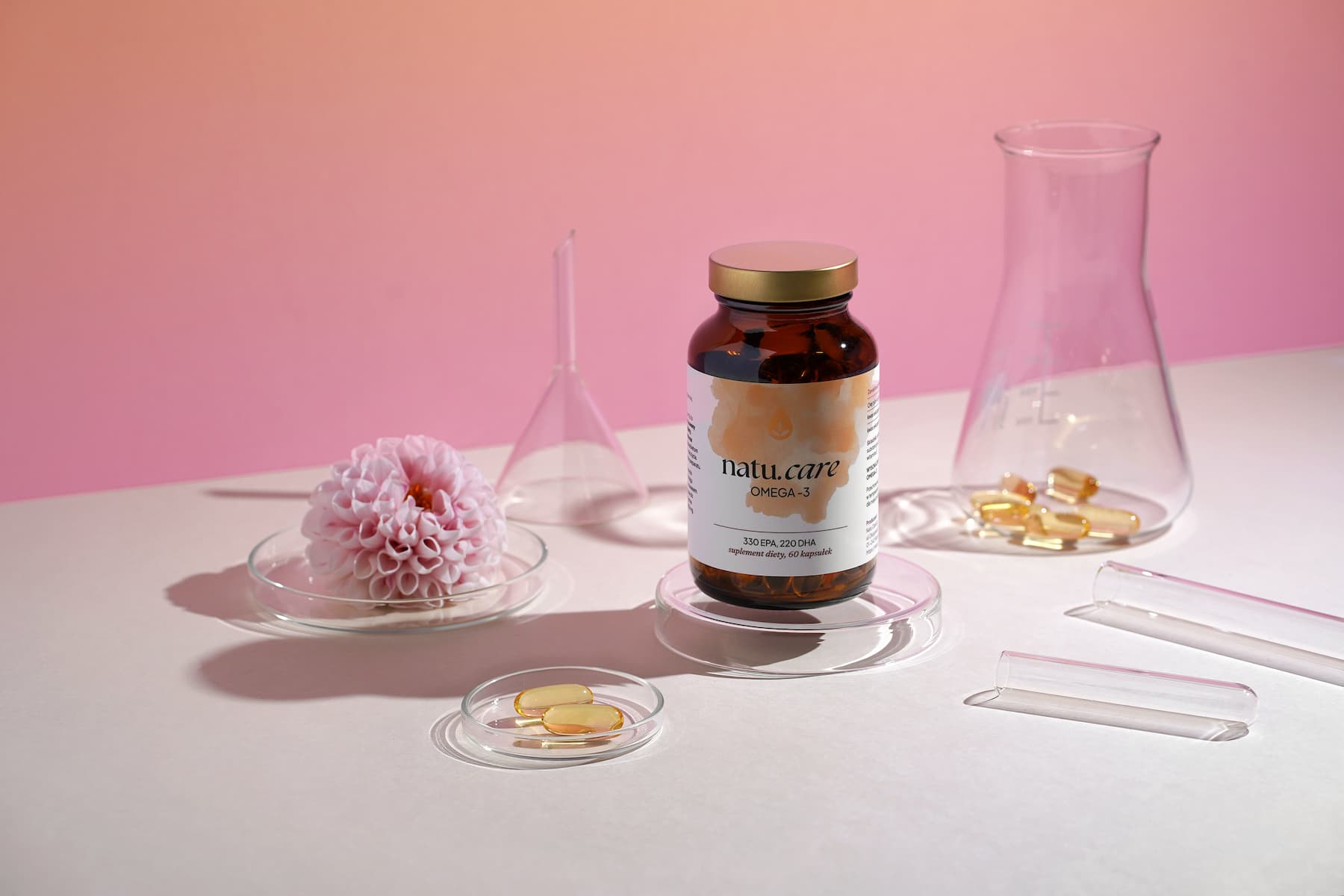
Omega-3 in a good dose and an optimum ratio of DHA and EPA acids will replenish valuable fats in the diet.

The omega-3 acids from Natu.Care are distinguished by their triglyceride form, which is characterised by high bioavailability.
